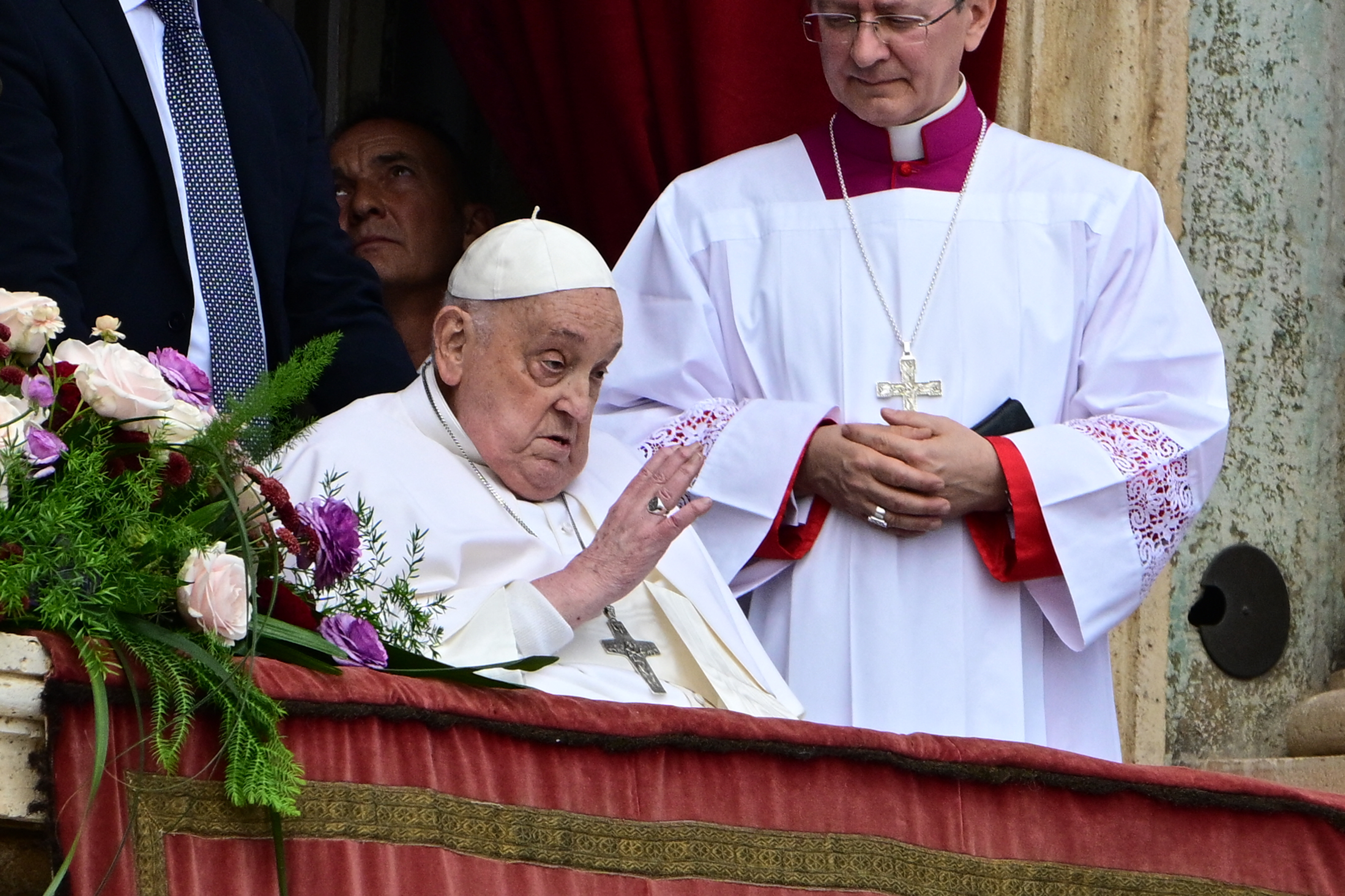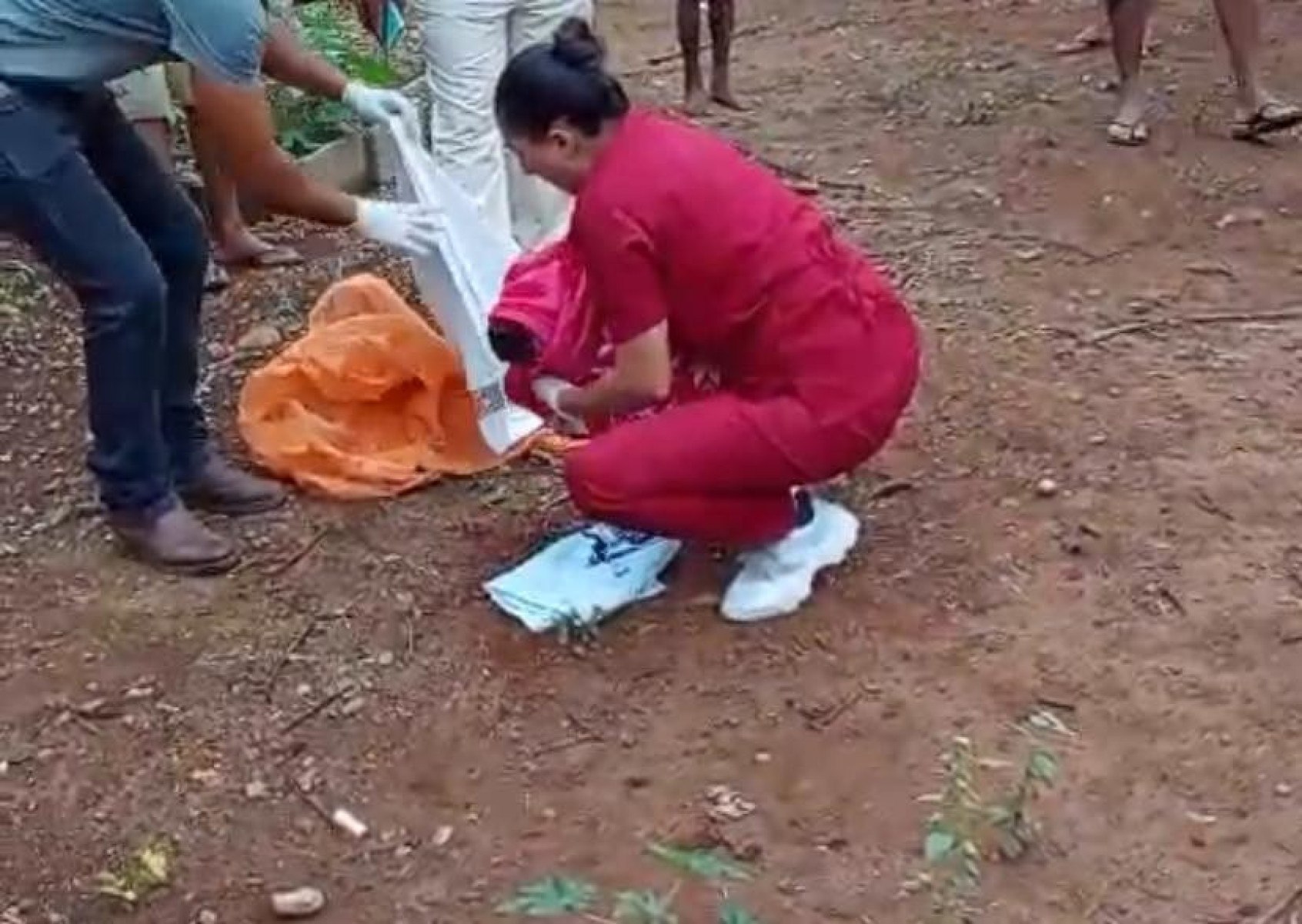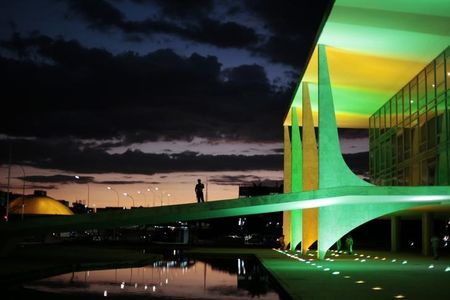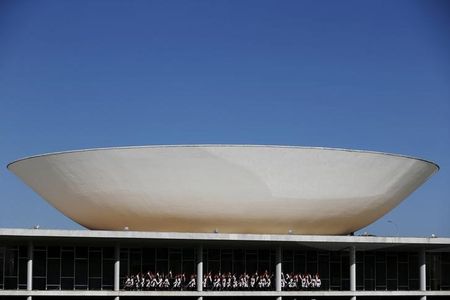“Extravagant things”
Translated by Christopher Peterson versão em português The post “Extravagant things” first appeared on revista piauí.

Translated by Christopher Peterson
The Brazilian National Football Team was knocked out of the round of eight in the 2022 Qatar World Cup, frustrating millions of fans, but a group of 49 Brazilians celebrated anyway. They enjoyed all the perks during the three weeks in which Brazil survived the competition, including a five-star hotel and tickets to the matches. Many of them enjoyed VIP treatment upon their arrival at the Doha International Airport (some had flown first class). At least one received a corporate expense card to spend up to 500 dollars a day, no strings attached. All the above was covered by the Brazilian Football Confederation (CBF), the top Brazilian football organization, although none of the 49 had any direct relationship to either the confederation or the state federations.
CBF president Ednaldo Rodrigues, from the state of Bahia, also charged his family’s expenses to the confederation, adding his wife, daughter, sister-in-law, son-in-law, and two grandchildren to the tab. They all flew first class, enjoyed VIP treatment at Doha Airport, and stayed at the Marriot Marquis City. His wife’s extra expenses at the hotel totaled more than seven thousand dollars. This would not be outrageous, especially for an organization with a turnover of 200 million dollars a year, but it is sufficient to stain the administrative image of a man who had taken office just months before, promising to “purge any and all immoral activities [from the confederation]”.
In addition to his own family, Rodrigues was careful not to forget his friends – from politics, the Judiciary, the press, and the arts. CBF paid for hotels, airline tickets (merely business class in this case), and tickets to three matches for National Deputy José Alves Rocha (from the União Brasil party, Bahia), who traveled with his wife Noelma. CBF spent more than 70 thousand dollars on the Rocha couple. Senator Ciro Nogueira (PP, Piauí), who attended the games with his girlfriend Flávia Rosalen, received a more modest package, a mere 40 thousand dollars. The Deputy and Senator are members of the “football caucus” in the Brazilian Congress. Senator Jaques Wagner (PT, Bahia) was also invited, but he stayed in Brazil in the middle of the government transition in 2022. But he sent his 47-year-old son Mateus in his place.
The fortunate 49 also included singer Gilberto Gil and his wife Flora, socialite Lilibeth Monteiro de Carvalho, Justice Julio Cezar Lemos Travessa of the Bahia Court of Justice, Pernambuco businessman Diogo Monteiro Lima, stylist Ricardo Almeida (who designed the footballers’ blazers for the Cup’s social events), former cinematographer from TV Globo José Carlos Cruz da Silva, Mosca (whom the CBF gave a corporate expense card for 500 dollars a day), and three more journalists from Bahia, all friends of Rodrigues. The grand total does not include the presidents of the 27 state federations, but it does include their wives and children. Most of them stayed at the City Centre Rotana, another five-star hotel in Doha.
Nobody from inside the press (or outside of it) paid much attention to the spending spree for the fortunate 49. After all, it was not the first time the CBF had showered such favors on individuals unaffiliated with the sport in their international tournaments. For example, in the 1998 World Cup in France, the reigning capo of CBF, Ricardo Teixeira, took five justices from the Rio de Janeiro Court of Justice, whose docket at the time featured five cases in which the confederation had a direct interest. However, this time even seasoned CBF staffers who had participated in several previous World Cups thought the unbridled spending had gone too far. The estimated cost to the confederation’s coffers was 600 thousand dollars.
“According to the organization’s statutes, the state federations should have been monitoring this lavish spending,” says one of the confederation’s eight vice-presidents, speaking on condition of anonymity. “The problem is that the state federations reproduce the very same behavior. The system is rigged.” The vice-president in question backed Rodrigues in the 2022 election but says he is critical of the misappropriation of the organization’s funds by the current administration. “Ednaldo is not the first CBF president to use the organization’s funds for personal purposes. But he is certainly the one that took this practice to a worrisome level,” he says.
And Ednaldo started early. Although he makes some 200 thousand dollars a month, counting his salary from CBF and commissions from the South American Confederation and FIFA, Rodrigues lived for nine months in the Grand Hyatt Hotel in Rio’s upscale Barra da Tijuca, when he took office as interim president in August 2021. Later, when he rose to full president, he moved to a gated community in the same neighborhood, but he spent stints at the hotel with his family, always on the CBF tab. For example, from February to May 2023, the organization covered 85 thousand dollars in hotel expenses for Rodrigues, his daughter Rafaela, and his sister-in-law Taíse.
Under his administration, CBF routinely paid for airfares from Rio de Janeiro to Salvador for his family and their entourage. The passengers included his wife, daughter, grandson, son-in-law, mother-in-law, brothers-in-law, nephew, and even the family hairdresser, Jorge Luiz Castro Gonçalves. Again, such expenses would not drain a billionaire organization’s coffers entirely, but they illustrate what the vice-president calls a “worrisome level”.
Rather than monitoring the situation, the state officials also take advantage of Rodrigues’s generosity. Until 2021, each state federation president earned 10 thousand dollars a month. When Rodrigues took over at CBF, he gave the so-called football league “top hats” a generous wage hike, to 43 thousand dollars a month, plus a “16th month” year-end bonus.
Besides fattening the football officials’ paychecks, Rodrigues distributes other perks. From October 21 to 29, 2022, CBF paid more than four thousand dollars in hotel expenses for Roberto Góes, president of the Amapá State Football Federation and CBF vice-president and his wife, the attorney Gláucia Costa Oliveira. The couple stayed at the Radisson Paulista Hotel in the elite Jardins neighborhood of São Paulo. (Roberto Góes is the former mayor of the Amapá state capital, Macapá. He served two months in prison in 2010, accused of embezzling municipal funds. Six years later he was sentenced to two years and eight months in prison, but his sentence was converted into services to a charitable organization. When the CBF paid the hotel bill for him and his wife, he had just been elected state congressman under the União Brasil party.)
A year and a half later, the Amapá State Football Federation asked CBF to pay airfares for Góes, his wife, sister, four-year-old daughter, and the nanny from Macapá to São Paulo, besides two suites in the five-star InterContinental Hotel in same neighborhood. The reason for the family’s trip had nothing to do with football: Góes’s wife was scheduled for surgery at a hospital in São Paulo. In the postop period, the physician recommended that the patient stay in the city for another week. Góes asked Rodrigues to extend their stay in São Paulo and to reschedule their return flight, all on the CBF bill.
In an audio message via WhatsApp to which piauí had access, Góes asks for the favor: “Hey, my friend Ednaldo, what’s new? Roberto here. My friend, I’m in São Paulo, Gláucia has just undergone a new procedure, surgery, and the physician asked us to stay another week. I’m going to need you to help me extend our hotel stay and reschedule our return flight. Big hugs! Waiting for feedback.” Rodrigues authorized the extra expense. CBF shelled out another 23 thousand dollars.
Numerous examples attest to the misuse of CBF funds for personal purposes. In April last year, the confederation held a general assembly in Rio de Janeiro, and the president of the Espírito Santo State Football Federation used the opportunity to take his family on a holiday. CBF covered the airfares and hotel expenses for his wife Priscila and their 10-year-old son. Such little favors form a mutual backscratching web. Both the Amapá and Espírito Santo state presidents voted for Rodrigues in the CBF presidential election in 2022 and remain his loyal allies.
Meanwhile, there is a shortage of funds to train referees. When Wilson Luiz Seneme took over as head of the CBF Refereeing Committee in April 2022, he submitted a proposal for an exclusive training center for referees, along the lines of the one at the South American Football Confederation (CONMEBOL) headquarters in Assunção, Paraguay, with a dining hall, dormitory, and pitches surrounded by video cameras to simulate plays. Seneme also suggested the creation of a refereeing school to standardize the referees’ technical training (such training is currently organized separately by each state federation, often with different methods – and calls).
Rodrigues authorized both projects, at an estimated cost of 12 million dollars. While he was watching over the construction of the referees’ training center and school, Seneme determined that all the referees in League A of the Brazilian Championship should attend a biweekly training session and physical examination at a private club in Rio de Janeiro. In August last year, citing budget constraints, Rodrigues suspended all CBF air travel and hotel expenses.
Since then, referee training has only taken place via videoconference. “It’s as if a football club hired a European coach who only trained the players remotely from Europe. It’s absurd,” one referee complained on condition of anonymity to avoid reprisals. The result was catastrophic. In last year’s championship, 110 referees were dismissed on grounds of technical errors, compared to 40 the year before last. Seneme, who declined our request for an interview, was fired this February. The referees’ training center and school never made it beyond the blueprint.
Ednaldo Rodrigues Gomes, 71 years old, has been the top official in Brazilian football for nearly four years. In the 1970s, he ventured a career as a left wing in his hometown of Vitória da Conquista, Bahia, but before long he switched from the pitches to football officialdom. First, he joined the Conquista Land Sports League. He later rose to the Bahia State Football Federation before reaching the presidency of CBF, the mission of which is “to lead and control football in Brazil’s territory”.
“For a black person like me with a humble upbringing, it’s an honor to occupy this place,” he said to piauí shortly before Carnaval in his spacious office on the third floor of the CBF headquarters in Barra da Tijuca. Rodrigues, medium height and slightly overweight, never looks his interlocutor straight in the eye. In the final weeks of February, he was nervous over the impending election. He wanted to remain at the helm of CBF for another four-year term. He viewed everything that had been surfacing in those pre-election days as persecution by the opposition. “I took office to change the institution’s reputation, and this creates resentment on the other side,” he said.
According to Rodrigues, reaction to the gravy train in the last World Cup was one such case of persecution. “It’s customary for sports organizations to issue invitations to relevant people and celebrities for them to attend major events,” he said. Concerning the favors to state officials, he claimed that “the expenses of family members of these people [presidents of state federations] are borne by them personally,” despite blatant evidence to the contrary, such as a WhatsApp audio. Concerning his personal expenses covered by CBF, he guaranteed that he had reimbursed the confederation’s treasury in full. piauí asked him to show the receipts for the reimbursements. As of this edition’s closing, Rodrigues had not provided any such documents.
His term in the CBF has been plagued by turmoil. In 2021, after the previous president, Rogério Caboclo, was removed from the confederation on grounds of moral and sexual harassment against a female employee, Rodrigues was one of the interim presidents. He remained as such until March the following year, when he was elected president. In December 2023, he was removed due to irregularities in the electoral process. He was reinstated in January 2024 under a ruling handed down by Federal Supreme Court Justice Gilmar Mendes.
Journalist Juca Kfouri, who has followed the mischief at CBF for more than five decades, believes that Rodrigues maneuvers to obtain the kind of backing his predecessors enjoyed. “Before, the power was concentrated in the hands of Ricardo Teixeira and Marco Polo Del Nero,” he says, referring to two of the confederation’s most notorious former presidents, both banned from football due to corruption. Rodrigues is getting there, although the CBF backrooms are plagued by a constant power struggle between officials, politicians, and even members of the Judiciary.
And how!
In January 2022, Ednaldo Rodrigues obtained an important victory in Brasília. The Rio de Janeiro Court of Justice had placed a lien on the equivalent of 10 million dollars in CBF bank accounts to force the confederation to pay four million dollars in damages to the Icasa football club in Juazeiro do Norte, Ceará. As soon as he learned of the lien, Rodrigues took two measures: he decided to appeal to the Supreme Court, and he retained an attorney from Maranhão, Gabriel Soares Amorim de Sousa, to the tune of more than 1.1 million dollars. He paid up front, and the contract did not even include a “contingency clause” (common in legal practice), whereby the attorney’s fees are contingent on the suit’s outcome.
The attorney obtained resounding success. He appealed to the Supreme Court on January 9, attaching 3,300 pages to the appeal. The following day, Chief Justice Humberto Martins issued an injunction suspending payment on CBF’s debt. The case’s lightning speed was highly unusual. That year, 2022, according to data from the National Council of Justice, the average time for ruling on petitions for injunctions from the Supreme Court was 55 days. The appeal in this case has remained at a standstill since the injunction was granted.
Gabriel de Sousa, the attorney, insists on the legitimacy of the terms in his contract. “It not only complies with market practices in Brasília. I’m considering requesting a contract amendment to readjust and restore my fees, given the complexity of the matter.” The Supreme Court also defends its super-fast-track processing. According to a note from its press advisory, “All the requests for interim protection distributed to the office of the Chief Justice, regardless of their volume or the number of pages, have been examined and ruled on with maximum urgency to avoid any damage or exhaustion of rights and/or to safeguard the parties’ assets.”
Two years later, Rodrigues obtained an even more significant victory in Brasília. On December 7, 2023, the same Rio de Janeiro Court of Justice had removed Rodrigues from his position on grounds that his election had been rigged. Rodrigues took two measures again: he appealed to the higher courts in Brasília, and he paid 1.3 million dollars from the CBF treasury to his righthand man, attorney Pedro Trengrouse.
The two invoices issued by the Trengrouse law office (to which piauí had access) show that the payments pertained to contracts signed on July 10 and December 4 that year. However, according to sources consulted by piauí, on December 4 Trengrouse was no longer defending CBF in any case, so it made no sense for him to have signed a contract on that date. In fact, he had already been replaced by law firms from Brasília. (Asked about this oddity, Trengrouse replied that “all payments received by my office pertain to attorney’s fees”, but he provided no details, claiming attorney-client privilege.)
Two weeks after hitting the jackpot, Trengrouse arrived in Brasília to help Rodrigues reclaim his office. The situation was complicated for the football official. The law offices in Brasília, among which that of Rafael Barroso Fontelles, nephew of Justice Luís Roberto Barroso, now Chief Justice, had already lost in the Superior Court of Justice and in the Supreme Court itself. So, on October 22, when Trengrouse reached the national capital, Rodrigues was pinning his hopes on a new case filed with the Supreme Court, this time by the Communist Party of Brazil (PCdoB), the party of CBF secretary-general Alcino Reis Rocha.
In such cases, the Supreme Court’s bylaws provide that the Chief Justice should refer the new appeal to the same judge that had been handling the matter originally, in this case Justice André Mendonça. But Barroso decided instead to draw lots to decide which judge would examine the appeal (When piauí contacted Barroso to explain this unusual decision, he did not get back to us.) The ruling on the appeal by the PCdoB fell into the hands of Justice Gilmar Mendes. It was a godsend.
Since August 2023, Justice Mendes has enjoyed direct relations with CBF through the Brazilian Institute of Teaching, Development, and Research (IDP), of which he is a founding partner. At the time, the CBF Academy, the organization’s arm that offers courses for coaches, trainers, and sports managers, was searching for a partner to help administer its courses. It had already knocked on the doors of several teaching institutions before attorney Trengrouse met with Francisco Schertel Mendes, general director of IDP and son of Justice Gilmar Mendes. They got along fabulously. By August, the contract was signed and sealed. IDP administered the courses and kept 84% of the revenue from the CBF Academy, estimated at 1.9 million dollars that year. The remaining 16% was kept by CBF.
Considering the tumultuous legal atmosphere at CBF, Ednaldo Rodrigues’s administration, which was entering its second full year (not including his term as interim president), relished the idea of a partnership with such an influential judge as Gilmar Mendes. At that stage, besides the case in the Rio de Janeiro Court of Justice, which had suspended Rodrigues from his presidency months before, CBF was constantly bombarded by the Congressional Inquiry in the Chamber of Deputies on the Manipulation of Results in Football Matches. The committee was headed by National Deputy Arthur Lira.
Gilmar Mendes could have recused himself from examining the appeal by the PCdoB, given his partnership with CBF, but he proceeded. On January 4, 2024, fearing that Brazil might have its registration for the Paris Olympics jeopardized by the president’s removal from the confederation, Mendes granted an injunction favoring Rodrigues, who returned to his seat. In October last year, Mendes submitted his injunction to the plenary of the Supreme Court, and sparks flew back and forth, the subtext of which was suspicion of dishonesty in both the Rio de Janeiro Court of Justice and CBF.
Upon reading his vote aloud, Mendes criticized the ruling by the Rio court in somewhat enigmatic terms: “These are extravagant things that happen in cases and that need to be taken note of.” Fellow Justice André Mendonça, who had previously ruled against the interests of CBF, took the floor and likewise criticized the judicial extravagances of the Rio court, but Gilmar intervened: “Your Excellency understands extravagances better than I.” He apparently intended his aside in the spirit of judicial comradeship, but Mendonça failed to appreciate it, scowled, and challenged the honesty of the current CBF administration. “Justice Gilmar, you may be certain that I do not [understand extravagances better], because when I encountered these facts, my impression was that the CBF would fail to weather any investigation.”
Gilmar Mendes simply turned a deaf ear and continued to expound on the reasoning for his vote. Hours later, the vote was interrupted when Justice Flávio Dino requested to review the case records. However, in February last year, even while Justice Dino was reviewing the case, Mendes authorized the request by the PCdoB and issued a ruling that validated Rodrigues’s election in 2022. And he gave three days to the court in Rio de Janeiro “to comply fully with the current ruling, extinguishing all other related cases”. The court in Rio complied.
The partnership between Justice Gilmar Mendes’s IDP and Ednaldo Rodrigues’s CBF is moving ahead full steam. Thus far at least three names connected with or nominated by the IDP have been granted positions in the confederation. They include CBF Chief of Cabinet (Hugo Teixeira), Legal Director (André Mattos), and Financial Director (Valdecir de Souza). CBF was also awarded with a branch office in Brasília in a house in the high-end Lago Sul neighborhood.
Extravagant things happened in those 28 days when Ednaldo Rodrigues was removed from the CBF presidency. The position’s vacancy triggered a fierce dispute to replace him. One of the first to announce his candidacy was football official Flavio Zveiter. Due to a common coincidence in the world of football, Flavio happens to be the son of Luiz Zveiter, then the most influential judge in the war-torn Rio de Janeiro Court of Justice. For vice-president on his ticket, the younger Zveiter picked Gustavo Feijó, a football official from the state of Alagoas and sworn enemy of Rodrigues. This also ensured him the support of a solid ally of Feijó, namely his fellow Alagoas native Arthur Lira, Speaker of the Brazilian Chamber of Deputies (where the Congressional Inquiry was playing out on the Manipulation of Football Matches, an investigation that plagued Rodrigues’s administration).
On December 21, just 13 days after Rodrigues was removed from the presidency, Feijó called a meeting in Brasília with all the stakeholders, including Rodrigues himself, to discuss his succession. The meeting took place in the office of attorney Maria Claudia Bucchianeri Pinheiro, who happens to be Arthur Lira’s lawyer. Lira, who has nothing to do with CBF, attended the meeting and tried to hammer out an agreement. He wanted his candidate Gustavo Feijó to head the ticket. Zveiter insisted on heading the slate himself. Reinaldo Carneiro Bastos, president of the São Paulo State Football Federation, and who had been called to the meeting, also resisted giving up his candidacy. Since nobody gave an inch, the agreement flopped.
It flopped, but not for long. After Rodrigues returned to his position thanks to the injunction, he tapped the CBF treasury again and hired a new attorney to handle the three cases then pending before the Superior Court of Justice. The attorney was none other than Maria Claudia Bucchianeri Pinheiro, who is now a justice of the Superior Electoral Court. The deal was sealed quickly. On January 12, just eight days after Rodrigues returned to the presidency, the contract was signed. CBF paid the equivalent of two million dollars, half of which up front and the remainder in ten installments, with no contingency clause. Since then, nobody has spoken out against Rodrigues, not even Feijó or Lira.
Rodrigues’s adversaries slowly dropped the legal battle against his presidency. Feijó threw in the towel on May 8. In just one paragraph, without stating a reason, he announced that he was dropping the case. On the same day (football is full of coincidences), CBF deposited the equivalent of 500 thousand dollars in Feijó’s account. According to the confederation, the payment pertained to a settlement on cases filed against CBF by Feijó in the Alagoas courts. piauí asked to see a document from the legal settlement, because the official case records show nothing to confirm it. As of this edition’s closing, we have received no such document.
Legally, CBF is a conventional not-for-profit association. Since it is not a conventional private company, it is not answerable to shareholders or partners. Since CBF is also not a government agency, nor does it receive public funds, it is not subject to constant inspection by the Public Prosecutor’s Office or the Federal Audit Court. In the case of CBF, inspection by these agencies is exclusively reactive. In other words, they only intervene if someone has filed a complaint.
“It’s a huge contradiction,” says Vitor Rhein Schirato, professor of administrative law at the University of São Paulo (USP), “because while CBF is self-administered and doesn’t answer to anyone, it controls an activity with obvious social interest.” According to Schirato, the Public Prosecutor’s Office could be more proactive. Theoretically, the use of government funds for personal purposes and overpriced payments can characterize misappropriation or even embezzlement.
Besides, CBF is a billionaire organization. In 2023, the last year with an available balance sheet, the confederation’s net revenue exceeded one billion reais (two hundred million dollars). And it is going to increase substantially in 2027, when the new sponsorship contract kicks in with Nike, worth 100 million dollars a year, compared to 35 million under the current contract. Another major source of revenue, just as large as the sponsorships, comes from broadcasting rights for the matches. Thus, with no constant surveillance by government agencies or private investors, and with a humongous cash flow, CBF has been coveted by both legitimately interested and unscrupulous parties.
It has not always been that way. Most of the CBF budget in the 1980s involved public funding, from the lotteries run by Caixa Economica Federal (the Brazilian Federal Savings and Loan Bank). But there seemed to be a shortage of money for almost everything, even to organize the Brazilian Championship. (In 1987, financially on the ropes, CBF devised an extra tournament called the “Copa União”.) However, in 1989, Ricardo Teixeira took over as head of CBF and changed everything. Adopting the playbook of his father-in-law, João Havelange, then-president of FIFA, Teixeira turbocharged the confederation’s revenue with money from the budding field of sports marketing, in partnership with the Traffic Sports licensing and advertising firm, owned by J. Hawilla. He also waived government funds, so CBF was no longer inspected by the Public Prosecutor’s Office or the Federal Audit Court.
That was the beginning of the spending spree. CBF became a rich and corrupt organization. In 2012, after a long reign, Teixeira stepped down from the presidency in the wake of a series of exposés of financial mismanagement in collusion with Traffic Sports. He was succeeded by José Maria Marin and then Marco Polo Del Nero. The entire crew – Teixeira, Hawilla, Marin, and Del Nero – soon became the target of an international investigation by the FBI on corruption in football. They all toppled together. Hawilla cut a plea deal to avoid imprisonment, and he died in 2018. Marin was sentenced to five years. Teixeira and Del Nero avoided prison but were banned from football forever.
Ednaldo Rodrigues reached this position after two previous lackluster administrations. First, that of Antônio Carlos Nunes de Lima, known as “Colonel Nunes”, a military official who had pulled off a double twist: first he supported the military dictatorship and later, under Brazil’s hard-won democracy, he was awarded damages as a “victim of an authoritarian act” committed by the same dictatorship. Second, that of Rogério Caboclo, sacked due to allegations of sexual harassment. Rodrigues took over as interim president in 2021 with the unanimous vote of the eight CBF vice-presidents. He was elected as full president in 2022 with 65 of the 67 valid votes.
With his victory, he promised integrity. “When I took over as interim president, the organization was like a ship in a storm. I had to hold the rudder steady. Now, with democracy here, I want to correct our direction,” he said. He went on to explain what he meant by new direction. “It’s doing better that which is legal, purging [the confederation of] any and all immoral activity.” His promise would be put to the test in the initial days of his term.
Rodrigues had scarcely taken office when he turned the CBF transportation department over to chauffer Anderson Castro de Souza, who had provided him with private driving services since he was one of the confederation’s eight vice-presidents. Anderson Souza’s company boasted a total share capital of 1 real (U$0.20), and corporate headquarters was in a humble house in the Brás de Pina neighborhood in Rio’s North Zone. On a single day in March 2022, the chauffer drove 36 league officials from the airports – some from the Galeão International Airport and others from the Santos Dumont Domestic Airport – to the CBF headquarters in Barra da Tijuca. He charged 158 thousand reais, the equivalent of more than thirty-one thousand dollars. (For comparison and taking the longest route from the International Airport to Barra da Tijuca, if CBF had put each official in an individual Uber Black, the most expensive model, the confederation would have spent only 11 thousand reais, or U$1,200, round trip.)
Three months later, the chauffeur managed to get CBF to hire a friend, detective Carlos Eduardo Chazan of the Civilian Police, whose company (founded just four months before) began to provide “personal protection support and consultancy services”. Under the contract, Chazan handles security for the CBF employees and headquarters, a six-story building. In just three months in 2023, May, July, and September, according to the spreadsheets accessed by piauí, Chazan was paid more than 40 thousand dollars a month. (The market rate for a similar-sized client is 16 thousand dollars.)
Besides siphoning-off funds, according to the 22 current and former CBF employees heard by piauí, Rodrigues centralizes all the decisions, granting zero autonomy to the departments. The Financial Department has already faced difficulty making petty payments, such as fixing the remote control on the TV set where Dorival Júnior, head coach of the Brazilian National Football Team, watches the matches. Last year, the Financial Department held back payment on that service for nearly two weeks until they received authorization from Rodrigues. Meanwhile, the fanciest remote control on the local market costs less than 30 dollars brand-new.
The delay might conceivably have been the result of over-zealous administration, but a former employee (hired during Rodrigues’s administration) reported that she encountered administrative mayhem when she got there: contracts scattered in drawers between various departments and payment orders with no formal records. “I got the impression that the disorganization was intentional,” she said. Another example of the disorder is that although the CBF rakes in billions in revenue, it is currently facing 43 different protests for non-payment of debts filed in notary offices in Brazil, totaling more than 500 thousand dollars. And Rodrigues graduated in accounting.
Architect Luísa Xavier da Silva Rosa was excited when she received an invitation from CBF during Rogério Caboclo’s administration to design 14 training centers across Brazil as part of the 2014 World Cup project. Rosa is specialized in sports arenas and participated in the team that designed the stadiums in Brazil for that World Cup. She accepted the challenge, and with part of the 100 million dollars in funds sent by FIFA, she purchased the land and started the construction.
When Rosa received an invitation from FIFA to work in the Qatar World Cup, Rodrigues, who had already taken office at CBF, refused her resignation. He named her to the position of CBF Assets Director with a monthly salary of six thousand dollars. (The previous director, according to her, made 19 thousand dollars a month.) In addition to the construction work on the training centers, the architect was now also in charge of the CBF headquarters and Granja Comary, where the National Team trains. Rosa was the first woman to head a department at CBF. “It is very important for everyone to see that your sex doesn’t matter. What matters is the work you do,” she told GE, the Globo media group’s portal.
That was the beginning of her ordeal. Once she was inside the corporate doors, CBF proved to be a hostile environment for women. Rosa witnessed the hiring of prostitutes to service guests at CBF and heard “all kinds of misogynous remarks”. She received WhatsApp messages with sexual innuendo from Arnoldo de Oliveira Nazareth Filho, affiliated with the Amazonas State Football Federation and one of many shady power brokers in CBF, and Rodrigo Paiva, then director of communication. She also routinely received “unwanted invitations” to lunches and dinners.
The descriptions in the previous paragraphs are recorded in the labor suit that Rosa filed against CBF after leaving the organization in July 2023. Paiva refuted the accusation in a press release late last year. “My professional career has always been marked by encouragement for deconstruction of harassment culture in Brazil, for women to be able to enjoy a decent, equitable workplace, free of discrimination.” Nazareth Filho failed to speak publicly on the matter. piauí was unable to locate him.
Attorney Cyntia Sussekind Rocha, representing Rosa in the labor suit, says that her client had not taken long “to realize that the department entrusted to her was in fact a big propaganda ploy, since she began to suffer various reprisals, undermining her authority, with all manner of humiliations”. The first such assault on her authority happened when the architect began to learn of the maintenance contracts at the Granja Comary training complex. Rodrigues quickly decided that only Nazareth Filho would handle the matter. Next, the president stopped authorizing payments for the construction projects under Rosa’s supervision and started firing employees in her department without consulting her (As of today, none of the 24 training centers has been concluded.)
In late 2022, Rosa launched a call for bids to fix the roof and balconies at the CBF headquarters, due to seepage and mold on the walls. Five companies submitted proposals, but Rodrigues claimed they were all overcharging. He hired a different company, MS Engineering and Building Maintenance, which charged a much lower price. It all went sideways. MS fail to produce the executive project or specify prices for the materials, and after Carnaval 2023, the first renovation that MS started – the auditorium’s ceiling – came crashing down due to flaws in the construction. Rosa wanted to cancel the contract with MS, but Rodrigues would hear nothing of it.
In early 2023, when she ordered an inspection of the fire detection system in the CBF building, the architect made an alarming discovery: she found a video-audio camera hidden under the smoke detector in the building’s restaurant. When she investigated the case, Rosa learned that the video and audio recordings were stored in a central facility located in a small room next to Rodrigues’s office, to which only he had access.
The architect also unearthed a WhatsApp exchange between Ricardo Lima, Rodrigues’s brother-in-law and current president of the Bahia State Football Federation, and an employee in the IT Department at CBF. The employee asks:
“Hidden cameras in the restaurant. Send to the Purchases Department? Good afternoon!”
“Good afternoon! Perfect. Yes, send [the recordings],” Ricardo Lima replied.
The news that the confederation was spying on employees landed like a bombshell. The department directors started to hold their meetings with their TV sets turned on full volume for fear of being overheard. One employee hired at the time (and who still works there) told piauí that on his first day at the job, one of his new coworkers handed him a note that said, “Careful with whatever you say, the whole place is bugged.” Since then, employees avoid eating lunch at the CBF restaurant. “We call this North Korea,” an employee said, speaking off the record to avoid reprisals. When we contacted Ricardo Lima, he declined to comment.
On May 24, already in psychological treatment for burnout, Rosa reached her limit and denounced the situation to the CBF Ethics Committee. On July 4, she was summoned to a meeting with then legal director Gamil Föppel, the director of compliance Hélio Menezes Júnior, and secretary-general Alcino Reis Rocha. She was fired during the meeting, accused of having leaked to the press the complaint she had filed with the Ethics Committee.
In her legal case against CBF, Rosa denied the leak and accused Rodrigo Paiva and Nazareth Filho of sexual harassment and Rodrigues of moral harassment. Last August, the court ruled in her favor and ordered CBF to pay her 12 thousand dollars in damages. CBF is appealing. Rodrigues retaliated by suing the architect and her attorney, accusing them of libel. Both women were acquitted. Gamil Föppel, the CBF legal director, also accused Rosa of libel. The case is still in court.
Rosa’s case had a painful impact on the CBF workplace, which employs some four hundred workers, an estimated 50% of whom are women. According to an internal survey in late 2023, more than half of the employees feel that “the workplace is not safe or free, and people are afraid of talking more about situations, including fear of retaliation or of being discredited by the system” and that they “would not file a grievance or complaint about such situations through current channels in the organization”.
In addition, 30% of those surveyed reported that they had been victims of discrimination, harassment, or psychological violence. Trouble in the CBF workplace is further evidenced by the increase in labor proceedings. Under Rodrigues’s administration, CBF has been sued 104 times in the labor courts, not including cases that are processed in confidentiality. In the four previous years, also excluding the confidential cases, there were 84 proceedings, or 24% fewer. CBF employees estimate that Rodrigues’s administration has already fired more than two hundred employees, around half of the entire workforce.
In December last year, former star football striker Ronaldo Nazário, known to fans as “Ronaldo Fenomeno”, announced his candidacy to the presidency of CBF. In an interview on Jornal Nacional, the primetime Globo national news program, Ronaldo said, “My goal is for CBF to become the most beloved company in Brazil.” He did not explicitly criticize Rodrigues’s administration, but he said that his own mission, if elected, would be “to reclaim Brazilian football’s prestige”. (In the 2026 World Cup, Brazil will be completing 24 years without winning a world title.)
That same month, Ronaldo set out in search of backing. In a conversation with National Deputy Aécio Neves, a Cruzeiro fan, he asked for help to schedule a meeting with Justice Gilmar Mendes. It worked. Gilmar and his wife (the attorney Guiomar Feitosa Mendes) offered a dinner at their home in Brasília. Besides Ronaldo and his advisor Victor Rios, the guests included Aécio himself and the host couple’s son, Francisco Schertel Mendes, who had closed the deal on the partnership between IDP and the CBF Academy.
Ronaldo wanted the Mendes family’s blessing to run for president, but he left the dinner emptyhanded. The clan had given signs that they were happy with Rodrigues’s administration. According to one of the guests, who spoke to piauí off the record, Francisco Mendes had made a positive remark about Rodrigues at one point during the meal. “He’s a standup guy,” he had said.
Ronaldo’s candidacy lasted less than four months. On March 12, without the Mendes family’s support and without the federation officials’ backing, the former star player threw in the towel. “The federations refused to receive me in their homes, with the argument that they were satisfied with the current administration and were supporting [Rodrigues’s] reelection. I was not even able to present my project, to show them my ideas, and to hear them as I would have liked. There was no opening for dialogue,” he said in a note on social media.
It makes sense. Rodrigues never once failed to court the federations, who gained extraordinary electoral weight since 2017. In the election to head the confederation, a state federation official’s vote counts as three votes. The vote of a League A team is worth two votes, while that of a League B team is worth just one vote. Since there are 27 federations (totaling 81 votes), 20 League A teams (40 votes), and 20 League B teams (20 votes), a candidate can win the CBF presidency without the votes of any team from either the A or B Leagues and can even win without the backing of six state federations.
In his reelection campaign, Rodrigues used the same devious trick as seasoned political sharks. He promised the eight slots for vice-presidents to two dozen different state federation officials. He later announced those who would be left off the slate, but only at the last minute, so they would not have time to organize an opposition ticket. Alone in the race, he scheduled the election on March 24, a Monday. At this stage the teams, always fearful of pressure from their federations, had no reason to cast blank votes. It would only have led to animosity from Rodrigues. Even the American John Textor, owner of the Botafogo club, who had called for the CBF president’s dismissal in 2023, insinuating that he was corrupt, now offered his support.
The result: Ednaldo Rodrigues Gomes won by a landslide. He won the votes of all the federations and all the teams. “Our legacy is always to prioritize civic spirt, transparency, honesty, and above all, to make Brazilian football increasingly stronger,” he said in a brief speech. He got a standing ovation. The next day he was in Buenos Aires to watch Argentina trounce Brazil 4 to 1.
The post “Extravagant things” first appeared on revista piauí.

























































.jpg)
















